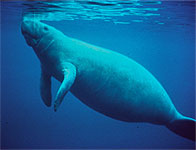 | Neurotoxic Red Tide Kills Manatees |  |
 | Neurotoxic Red Tide Kills Manatees |  |
 April 21, 2003
April 21, 2003Those poor manatees! These large, slow-moving, plant-eating, endangered mammals that live in rivers and coastal waters around Florida have a lot to worry about. With only approximately 3,000 manatees left in Florida waters, these creatures face a new challenge that threatens their survival. Manatees are sometimes killed by boats that run over them. Now these animals have something else to worry about: a natural toxin that poisons their nervous system!
In Florida, red tides are produced by microscopic algae called Karenia brevis (K. brevis). When there are high concentrations of this algae, the water can become poisoned after the algae release a toxin called "brevetoxin." Brevetoxin can be eaten or inhaled. This toxin affects the nervous system by activating sodium channels on neurons. This can lead to paralysis and loss of coordination. As a result, the manatee poisoned by brevetoxin may be unable to swim and it may drown. News agencies have reported that some recovering manatees were saved by people who held the animals' heads above water. |
 References and more information:
References and more information:
|
| GO TO: | Neuroscience In The News | Explore the Nervous System | Table of Contents |
![[email]](./gif/menue.gif) Send E-mail |
 Fill out survey |
 Get Newsletter |
 Search Pages |